Backgrounder
Caught Between China & Japan: Superstar Li Xianglan
Li Xianglan (李香兰) aka Yamaguchi Yoshiko passed away at the age of 94. A rising star during the Sino-Japanese War, she was loved by those who believed she was Chinese and later hated for being Japanese.
Published
10 years agoon

WHAT’S ON WEIBO ARCHIVE | PREMIUM CONTENT ARTICLE
She called China her fatherland and Japan her motherland. Singer and actress Yamaguchi Yoshiko, better known as Li Xianglan (李香兰), has passed away at the age of 94. A rising star during the Sino-Japanese War, she was loved by both Chinese and Japanese audiences. On Sina Weibo, she is commemorated as a star and a traitor – even causing controversy after her death.
Yamaguchi Yoshiko was born in 1920 to Japanese parents in Manchuria. In accordance with Chinese tradition, she had two Chinese adoptive fathers who gave her the Chinese name Li Xianglan. As the Sino-Japanese War was on the way, Li jumped to superstar status as a singer and actress. She was fluent in Mandarin. The Chinese audience did not know she was Japanese, as Li Xianglan hid her true identity throughout the war. During the 1930s and 1940s, Li was emotionally conflicted by both the Chinese hostile attitude towards the Japanese and the Japanese mistreatment of the Chinese, as she later writes in her autobiography “My Life as Li Xianglan” (Halloran 2004).
During the war years, Li starred in seventeen different films. One of them was the hit film Eternity (1943), that made her and her songs popular throughout China. But she also starred in so-called “Chinese continental friendship films”: films produced by Japanese studios that were screened in China, and that depicted the Japanese in a positive manner. The most famous one is Night in China (1940), where Li plays the role of a Chinese girl that detests the Japanese invaders but ends up falling in love with a Japanese naval captain. Li Xianglan was later criticized for playing in these films, that were considered to be “shameful for the country” (Stephenson 2002, 2).
By the end of the war, Li Xianglan was arrested as a Chinese national for ‘betrayal of China’s national interests’ because of her roles in Japanese-produced films. She was facing the death penalty for treason against the Chinese government. Because she was officially recorded in the Yamaguchi family register, Li Xianglan (Yamaguchi Yoshiko) could prove her Japanese identity to Chinese authorities. This lead to the dismissal of charges of treason, and her ‘repatriation’ to Japan, a country that was never actually her home (Stephenson 2002, 9). In 1950, she went to the United States to “learn to kiss like they do in Hollywood movies.” She took on the name of Shirley Yamaguchi, befriended Charlie Chapin, and starred in several Hollywood films, such as Japanese War Bride and House of Bamboo. Yamaguchi was later denied access to the United States because of her connections to suspected Communist sympathizers. She returned to Japan and started a career in journalism and politics. She then became known under the name of her husband, Otaka Yoshiko (2002, 10).
“Although she was Japanese, she had a good heart. The Chinese people will not forget you“, one netizen says on Sina Weibo. Other microbloggers are less positive: “She was a dwarf [‘倭’ old derogatory for Japanese], and just because she lived in the occupied Northeast for a few years, she changed her name into a Chinese one. She pretended to be a Chinese celebrity. She brainwashed Chinese all the way from the north to the south. It was not until everyone thought she was a traitor after the war that she revealed her dwarf blood. Some people might still commemorate her, but your fu*king candles don’t mean anything.”
“Li Xianglan brainwashed Chinese people from the North to the South”
She was known as Li Xianglan, Yamaguchi Yoshiko, Shirley Yamaguchi, Ri Koran (the Japanese pronunciation of her Chinese name) and Otaka Yoshiko. During her life in politics and journalism, she was involved in the Palestinian issue and reported the Vietnam War. Sino-Japanese relations were an important subject to her. One Weibo netizen honors Li Xianglan by saying: “She is gone with the wind. I hope that one day her fatherland and her motherland will have eternal peace and friendship. It is possible for China and Japan to get along!” Li Xianglan would have been happy to read it. The day that Sino-Japanese relations were officially restored in 1972, she cried. About that moment she said: “I certainly was happy that day. I even think that very day was the “best day of my life”” (Tanaka et al 2004).
“The day that Sino-Japanese Relations were restored was the best day of my life” – Li Xianglan
To listen to one of Li Xianglan’s songs, check out the video below. Don’t forget to close your eyes for a second, hear the vinyl, and you are right back in history. The song below (‘Flowers of Spring’) is sung in Japanese:
References:
Halloran, Fumiko. 2004. “My Life as Li Xianglan.” The Japan Society http://www.japansociety.org.uk/29953/my-life-as-li-xianglan/ (Accessed September 14, 2014).
Stephenson, Shelley. 2002. “A Star by Any Other Name: The (After) Lives of Li Xianglan.” Quarterly Review of Film & Video 19: 1-13.
Tanaka Hiroshi, Utsumi Aiko and Onuma Yasuaki. 2004. “Looking Back on My Days as Ri Koran.” The Asia-Pacific Journal: Japan Focus http://www.japanfocus.org/-Onuma-Yasuaki/1571 (Accessed September 14, 2014).
©2014 Whatsonweibo. All rights reserved. Do not reproduce without permission – you can contact us at info@whatsonweibo.com.
Manya Koetse is the founder and editor-in-chief of whatsonweibo.com. She is a writer, public speaker, and researcher (Sinologist, MPhil) on social trends, digital developments, and new media in an ever-changing China, with a focus on Chinese society, pop culture, and gender issues. She shares her love for hotpot on hotpotambassador.com. Contact at manya@whatsonweibo.com, or follow on Twitter.

Backgrounder
“Oppenheimer” in China: Highlighting the Story of Qian Xuesen
Qian Xuesen is a renowned Chinese scientist whose life shares remarkable parallels with Oppenheimer’s.
Published
10 months agoon
September 16, 2023By
Zilan Qian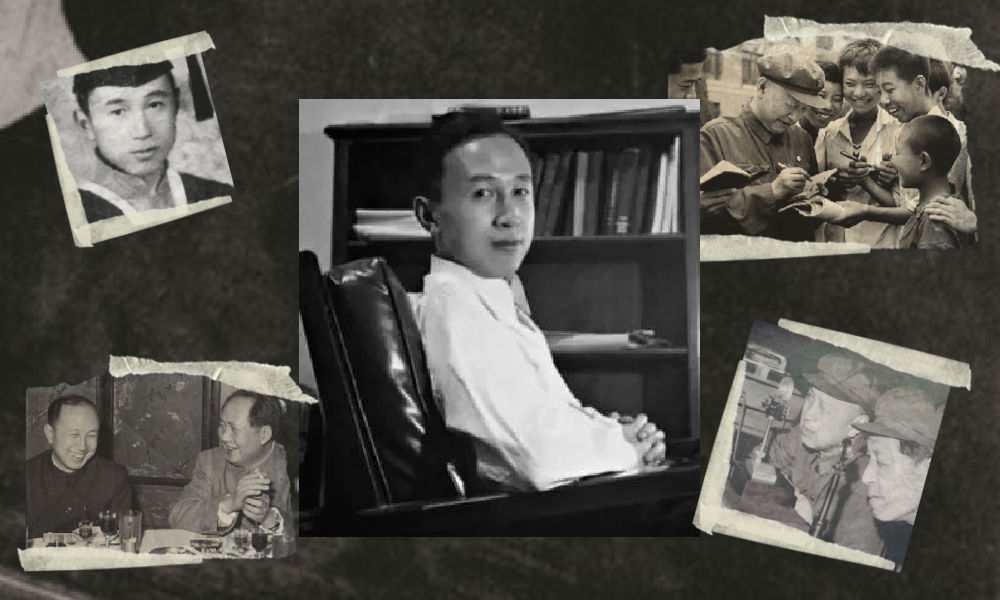
They shared the same campus, lived in the same era, and both played pivotal roles in shaping modern history while navigating the intricate interplay between science and politics. With the release of the “Oppenheimer” movie in China, the renowned Chinese scientist Qian Xuesen is being compared to the American J. Robert Oppenheimer.
In late August, the highly anticipated U.S. movie Oppenheimer finally premiered in China, shedding light on the life of the famous American theoretical physicist J. Robert Oppenheimer (1904-1967).
Besides igniting discussions about the life of this prominent scientist, the film has also reignited domestic media and public interest in Chinese scientists connected to Oppenheimer and nuclear physics.
There is one Chinese scientist whose life shares remarkable parallels with Oppenheimer’s. This is aerospace engineer and cyberneticist Qian Xuesen (钱学森, 1911-2009). Like Oppenheimer, he pursued his postgraduate studies overseas, taught at Caltech, and played a pivotal role during World War II for the US.
Qian Xuesen is so widely recognized in China that whenever I introduce myself there, I often clarify my last name by saying, “it’s the same Qian as Qian Xuesen’s,” to ensure that people get my name.
Some Chinese blogs recently compared the academic paths and scholarly contributions of the two scientists, while others highlighted the similarities in their political challenges, including the revocation of their security clearances.
The era of McCarthyism in the United States cast a shadow over Qian’s career, and, similar to Oppenheimer, he was branded as a “communist suspect.” Eventually, these political pressures forced him to return to China.
Although Qian’s return to China made his later life different from Oppenheimer’s, both scientists lived their lives navigating the complex dynamics between science and politics. Here, we provide a brief overview of the life and accomplishments of Qian Xuesen.
Departing: Going to America
Qian Xuesen (钱学森, also written as Hsue-Shen Tsien), often referred to as the “father of China’s missile and space program,” was born in Shanghai in 1911,1 a pivotal year marked by a historic revolution that brought an end to the imperial dynasty and gave rise to the Republic of China.
Much like Oppenheimer, who pursued further studies at Cambridge after completing his undergraduate education, Qian embarked on a journey to the United States following his bachelor’s studies at National Chiao Tung University (now Shanghai Jiao Tong University). He spent a year at Tsinghua University in preparation for his departure.
The year was 1935, during the eighth year of the Chinese Civil War and the fourth year of Japan’s invasion of China, setting the backdrop for his academic pursuits in a turbulent era.
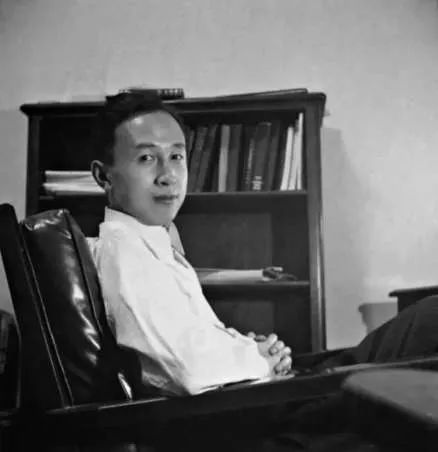
Qian in his office at Caltech (image source).
One year after arriving in the U.S., Qian earned his master’s degree in aeronautical engineering from the Massachusetts Institute of Technology (MIT). Three years later, in 1939, the 27-year-old Qian Xuesen completed his PhD at the California Institute of Technology (Caltech), the very institution where Oppenheimer had been welcomed in 1927. In 1943, Qian solidified his position in academia as an associate professor at Caltech. While at Caltech, Qian helped found NASA’s Jet Propulsion Laboratory.
When World War II began, while Oppenheimer was overseeing the Manhattan Project’s efforts to assist the U.S. in developing the atomic bomb, Qian actively supported the U.S. government. He served on the U.S. government’s Scientific Advisory Board and attained the rank of lieutenant colonel.

The first meeting of the US Department of the Air Force Scientific Advisory Board in 1946. The predecessor, the Scientific Advisory Group, was founded in 1944 to evaluate the aeronautical programs and facilities of the Axis powers of World War II. Qian can be seen standing in the back, the second on the left (image source).
After the war, Qian went to teach at MIT and returned to Caltech as a full-time professor in 1949. During that same year, Mao Zedong proclaimed the establishment of the People’s Republic of China (PRC). Just one year later, the newly-formed nation became involved in the Korean War, and China fought a bloody battle against the United States.
Red Scare: Being Labeled as a Communist
Robert Oppenheimer and Qian Xuesen both had an interest in Communism even prior to World War II, attending communist gatherings and showing sympathy towards the Communist cause.
Qian and Oppenheimer may have briefly met each other through their shared involvement in communist activities. During his time at Caltech, Qian secretly attended meetings with Frank Oppenheimer, the brother of J. Robert Oppenheimer (Monk 2013).
However, it was only after the war that their political leanings became a focal point for the FBI.
Just as the FBI accused Oppenheimer of being an agent of the Soviet Union, they quickly labeled Qian as a subversive communist, largely due to his Chinese heritage. While the government did not succeed in proving that Qian had communist ties with China during that period, they did ultimately succeed in portraying Qian as a communist affiliated with China a decade later.
During the transition from the 1940s to the 1950s, the Cold War was underway, and the anti-communist witch-hunts associated with the McCarthy era started to intensify (BBC 2020).
In 1950, the Korean War erupted, with the People’s Republic of China (PRC) joining North Korea in the conflict against South Korea, which received support from the United States. It was during this tumultuous period that the FBI officially accused Qian of communist sympathies in 1950, leading to the revocation of his security clearance despite objections from Qian’s colleagues. Four years later, in 1954, Robert Oppenheimer went through a similar process.
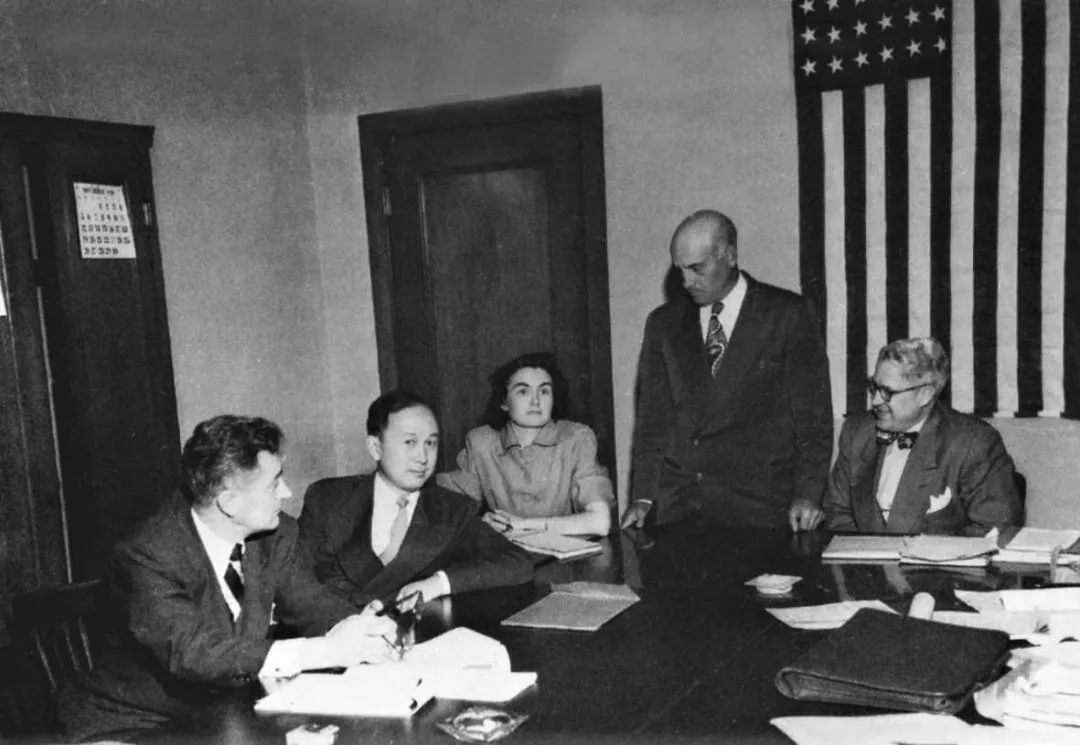
The 1950’s security hearing of Qian (second left). (Image source).
After losing his security clearance, Qian began to pack up, saying he wanted to visit his aging parents back home. Federal agents seized his luggage, which they claimed contained classified materials, and arrested him on suspicion of subversive activity. Although Qian denied any Communist leanings and rejected the accusation, he was detained by the government in California and spent the next five years under house arrest.
Five years later, in 1955, two years after the end of the Korean War, Qian was sent home to China as part of an apparent exchange for 11 American airmen who had been captured during the war. He told waiting reporters he “would never step foot in America again,” and he kept his promise (BBC 2020).
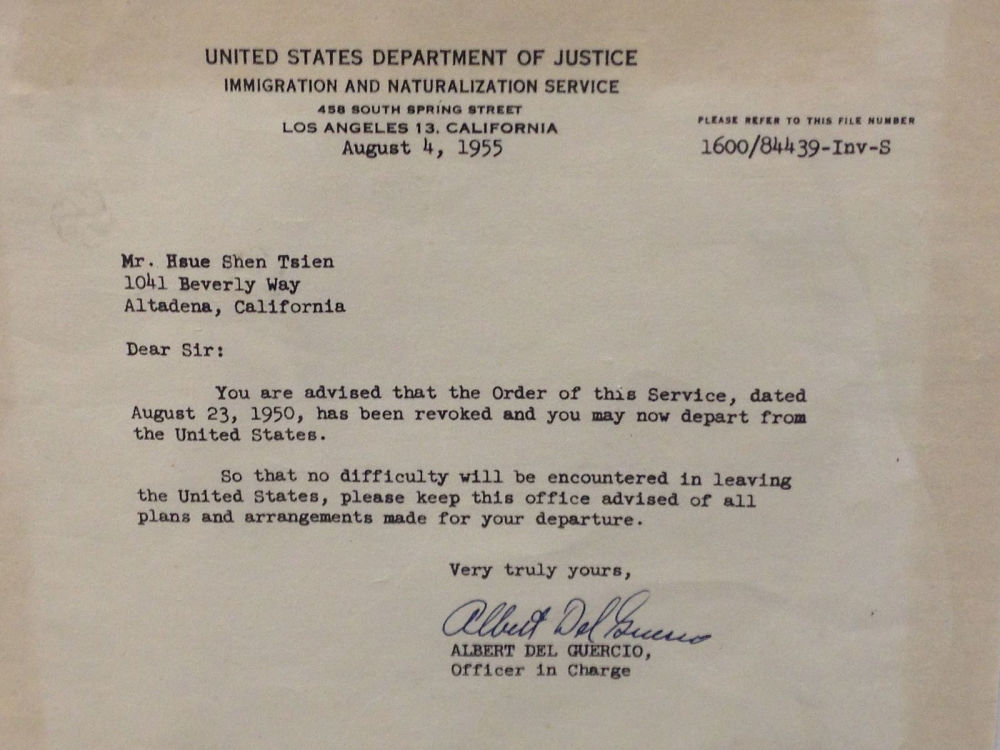
A letter from the US Immigration and Naturalization Service to Qian Xuesen, dated August 4, 1955, in which he was notified he was allowed to leave the US. The original copy is owned by Qian Xuesen Library of Shanghai Jiao Tong University, where the photo was taken. (Caption and image via wiki).
Dan Kimball, who was the Secretary of the US Navy at the time, expressed his regret about Qian’s departure, reportedly stating, “I’d rather shoot him dead than let him leave America. Wherever he goes, he equals five divisions.” He also stated: “It was the stupidest thing this country ever did. He was no more a communist than I was, and we forced him to go” (Perrett & Bradley, 2008).
Kimball may have foreseen the unfolding events accurately. After his return to China, Qian did indeed assume a pivotal role in enhancing China’s military capabilities, possibly surpassing the potency of five divisions. The missile programme that Qian helped develop in China resulted in weapons which were then fired back on America, including during the 1991 Gulf War (BBC 2020).
Returning: Becoming a National Hero
The China that Qian Xuesen had left behind was an entirely different China than the one he returned to. China, although having relatively few experts in the field, was embracing new possibilities and technologies related to rocketry and space exploration.
Within less than a month of his arrival, Qian was welcomed by the then Vice Prime Minister Chen Yi, and just four months later, he had the honor of meeting Chairman Mao himself.
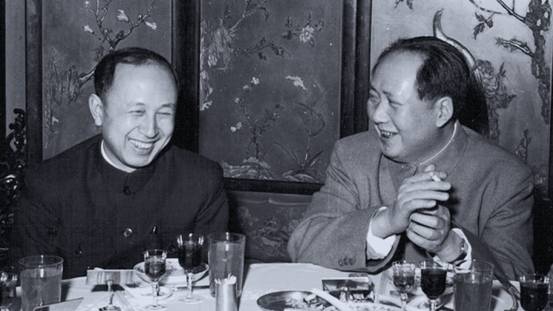
Qian and Mao (image source).
In China, Qian began a remarkably successful career in rocket science, with great support from the state. He not only assumed leadership but also earned the distinguished title of the “father” of the Chinese missile program, instrumental in equipping China with Dongfeng ballistic missiles, Silkworm anti-ship missiles, and Long March space rockets.
Additionally, his efforts laid the foundation for China’s contemporary surveillance system.
By now, Qian has become somewhat of a folk hero. His tale of returning to China despite being thwarted by the U.S. government has become like a legendary narrative in China: driven by unwavering patriotism, he willingly abandoned his overseas success, surmounted formidable challenges, and dedicated himself to his motherland.
Throughout his lifetime, Qian received numerous state medals in recognition of his work, establishing him as a nationally celebrated intellectual. From 1989 to 2001, the state-launched public movement “Learn from Qian Xuesen” was promoted throughout the country, and by 2001, when Qian turned 90, the national praise for him was on a similar level as that for Deng Xiaoping in the decade prior (Wang 2011).
Qian Xuesen remains a celebrated figure. On September 3rd of this year, a new “Qian Xuesen School” was established in Wenzhou, Zhejiang Province, becoming the sixth high school bearing the scientist’s name since the founding of the first one only a year ago.
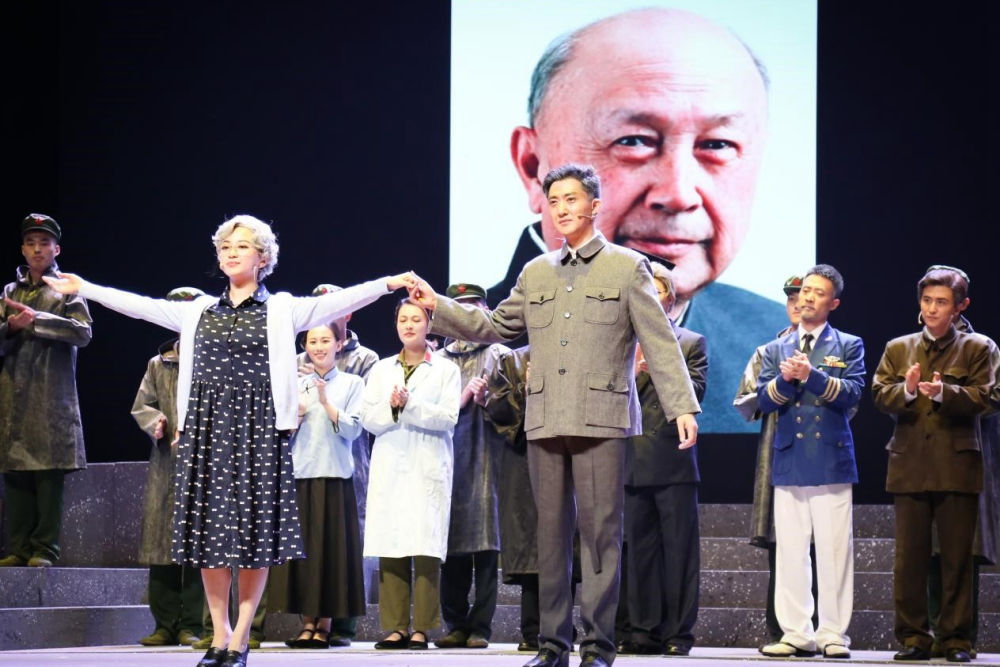
In 2017, the play “Qian Xuesen” was performed at Qian’s alma mater, Shanghai Jiaotong University. (Image source.)
Qian Xuesen’s legacy extends well beyond educational institutions. His name frequently appears in the media, including online articles, books, and other publications. There is the Qian Xuesen Library and a museum in Shanghai, containing over 70,000 artefacts related to him. Qian’s life story has also been the inspiration for a theater production and a 2012 movie titled Hsue-Shen Tsien (钱学森).2
Unanswered Questions
As is often the case when people are turned into heroes, some part of the stories are left behind while others are highlighted. This holds true for both Robert Oppenheimer and Qian Xuesen.
The Communist Party of China hailed Qian as a folk hero, aligning with their vision of a strong, patriotic nation. Many Chinese narratives avoid the debate over whether Qian’s return was linked to problems and accusations in the U.S., rather than genuine loyalty to his homeland.
In contrast, some international media have depicted Qian as a “political opportunist” who returned to China due to disillusionment with the U.S., also highlighting his criticism of “revisionist” colleagues during the Cultural Revolution and his denunciation of the 1989 student demonstrations.
Unlike the image of a resolute loyalist favored by the Chinese public, Qian’s political ideology was, in fact, not consistently aligned, and there were instances where he may have prioritized opportunity over loyalty at different stages of his life.
Qian also did not necessarily aspire to be a “flawless hero.” Upon returning to China, he declined all offers to have his biography written for him and refrained from sharing personal information with the media. Consequently, very little is known about his personal life, leaving many questions about the motivations driving him, and his true political inclinations.

The marriage photo of Qian and Jiang. (Image source).
We do know that Qian’s wife, Jiang Ying (蒋英), had a remarkable background. She was of Chinese-Japanese mixed race and was the daughter of a prominent military strategist associated with Chiang Kai-shek. Jiang Ying was also an accomplished opera singer and later became a professor of music and opera at the Central Conservatory of Music in Beijing.
Just as with Qian, there remain numerous unanswered questions surrounding Oppenheimer, including the extent of his communist sympathies and whether these sympathies indirectly assisted the Soviet Union during the Cold War.
Perhaps both scientists never imagined they would face these questions when they first decided to study physics. After all, they were scientists, not the heroes that some narratives portray them to be.
Also read:
■ Farewell to a Self-Taught Master: Remembering China’s Colorful, Bold, and Iconic Artist Huang Yongyu
■ “His Name Was Mao Anying”: Renewed Remembrance of Mao Zedong’s Son on Chinese Social Media
By Zilan Qian
Follow @whatsonweibo
1 Some sources claim that Qian was born in Hangzhou, while others say he was born in Shanghai with ancestral roots in Hangzhou.
2The Chinese character 钱 is typically romanized as “Qian” in Pinyin. However, “Tsien” is a romanization in Wu Chinese, which corresponds to the dialect spoken in the region where Qian Xuesen and his family have ancestral roots.
This article has been edited for clarity by Manya Koetse
References (other sources hyperlinked in text)
BBC. 2020. “Qian Xuesen: The man the US deported – who then helped China into space.” BBC.com, 27 October https://www.bbc.com/news/stories-54695598 [9.16.23].
Monk, Ray. 2013. Robert Oppenheimer: A Life inside the Center, First American Edition. New York: Doubleday.
Perrett, Bradley, and James R. Asker. 2008. “Person of the Year: Qian Xuesen.” Aviation Week and Space Technology 168 (1): 57-61.
Wang, Ning. 2011. “The Making of an Intellectual Hero: Chinese Narratives of Qian Xuesen.” The China Quarterly, 206, 352-371. doi:10.1017/S0305741011000300
Get the story behind the hashtag. Subscribe to What’s on Weibo here to receive our newsletter and get access to our latest articles:
Spotted a mistake or want to add something? Please let us know in comments below or email us. First-time commenters, please be patient – we will have to manually approve your comment before it appears.
©2023 Whatsonweibo. All rights reserved. Do not reproduce our content without permission – you can contact us at info@whatsonweibo.com.
Backgrounder
Farewell to a Self-Taught Master: Remembering China’s Colorful, Bold, and Iconic Artist Huang Yongyu
Renowned Chinese artist and the creator of the ‘Blue Rabbit’ zodiac stamp Huang Yongyu has passed away at the age of 98. “I’m not afraid to die. If I’m dead, you may tickle me and see if I smile.”
Published
1 year agoon
June 15, 2023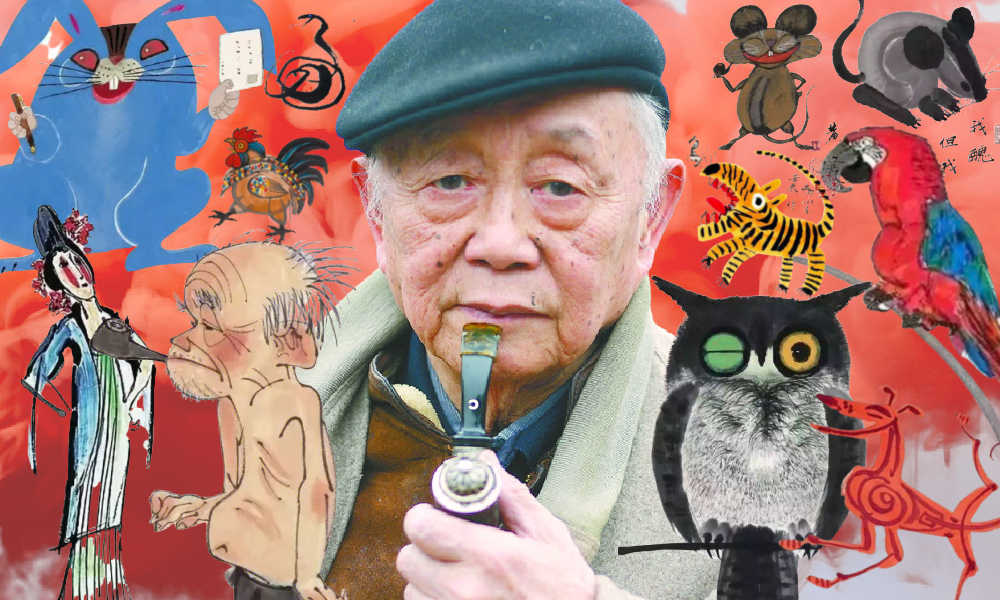
The famous Chinese painter, satirical poet, and cartoonist Huang Yongyu has passed away. Born in 1924, Huang endured war and hardship, yet never lost his zest for life. When his creativity was hindered and his work was suppressed during politically tumultuous times, he remained resilient and increased “the fun of living” by making his world more colorful.
He was a youthful optimist at old age, and will now be remembered as an immortal legend. The renowned Chinese painter and stamp designer Huang Yongyu (黄永玉) passed away on June 13 at the age of 98. His departure garnered significant attention on Chinese social media platforms this week.
On Weibo, the hashtag “Huang Yongyu Passed Away” (#黄永玉逝世#) received over 160 million views by Wednesday evening.
Huang was a member of the China National Academy of Painting (中国国家画院) as well as a Professor at the Central Academy of Fine Arts (中央美术学院).
Huang Yongyu is widely recognized in China for his notable contribution to stamp design, particularly for his iconic creation of the monkey stamp in 1980. Although he designed a second monkey stamp in 2016, the 1980 stamp holds significant historical importance as it marked the commencement of China Post’s annual tradition of releasing zodiac stamps, which have since become highly regarded and collectible items.
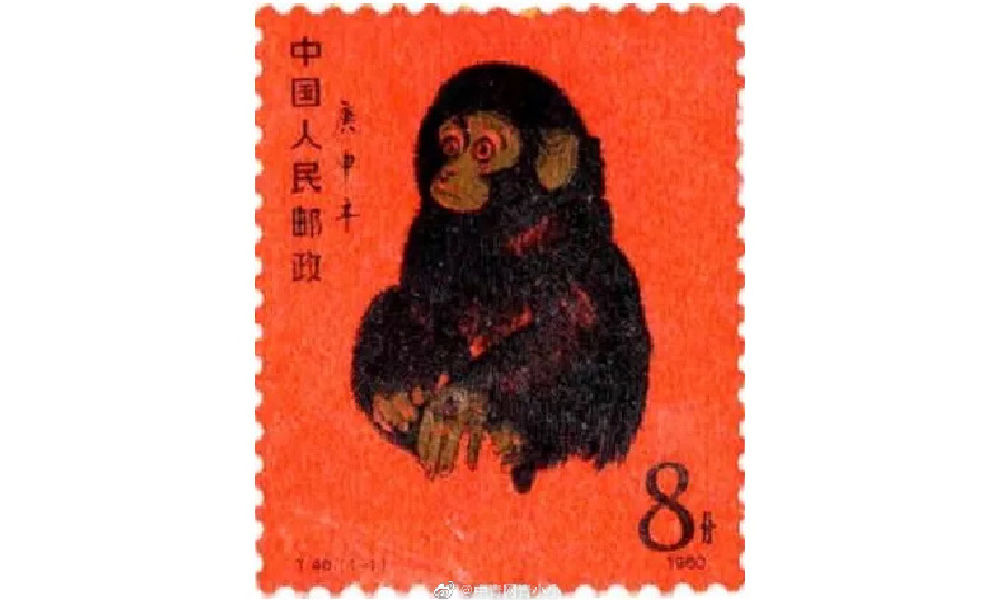
Huang’s famous money stamp that was issued by China Post in 1980.
The monkey stamp designed by Huang Yongyu has become a cherished collector’s item, even outside of China. On online marketplaces like eBay, individual stamps from this series are being sold for approximately $2000 these days.
Huang Yongyu’s latest most famous stamp was this year’s China Post zodiac stamp. The stamp, a blue rabbit with red eyes, caused some online commotion as many people thought it looked “horrific.”
Some thought the red-eyed blue rabbit looked like a rat. Others thought it looked “evil” or “monster-like.” There were also those who wondered if the blue rabbit looked so wild because it just caught Covid.
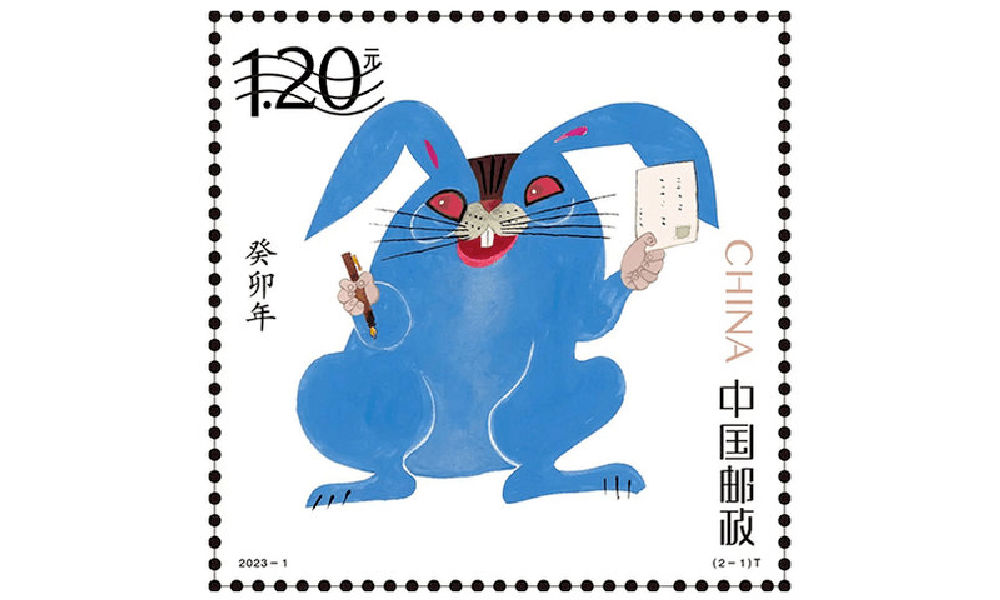
Huang’s (in)famous blue rabbit stamp.
Nevertheless, many people lined up at post offices for the stamps and they immediately sold out.
In light of the controversy, Huang Yongyu spoke about the stamps in a livestream in January of 2023. The 98-year-old artist claimed he had simply drawn the rabbit to spread joy and celebrate the new year, stating, “Painting a rabbit stamp is a happy thing. Everyone could draw my rabbit. It’s not like I’m the only one who can draw this.”
Huang’s response also went viral, with one Weibo hashtag dedicated to the topic receiving over 12 million views (#蓝兔邮票设计者直播回应争议#) at the time. Those defending Huang emphasized how it was precisely his playful, light, and unique approach to art that has made Huang’s work so famous.
A Self-Made Artist
“I’m ugly, but my mum likes me”
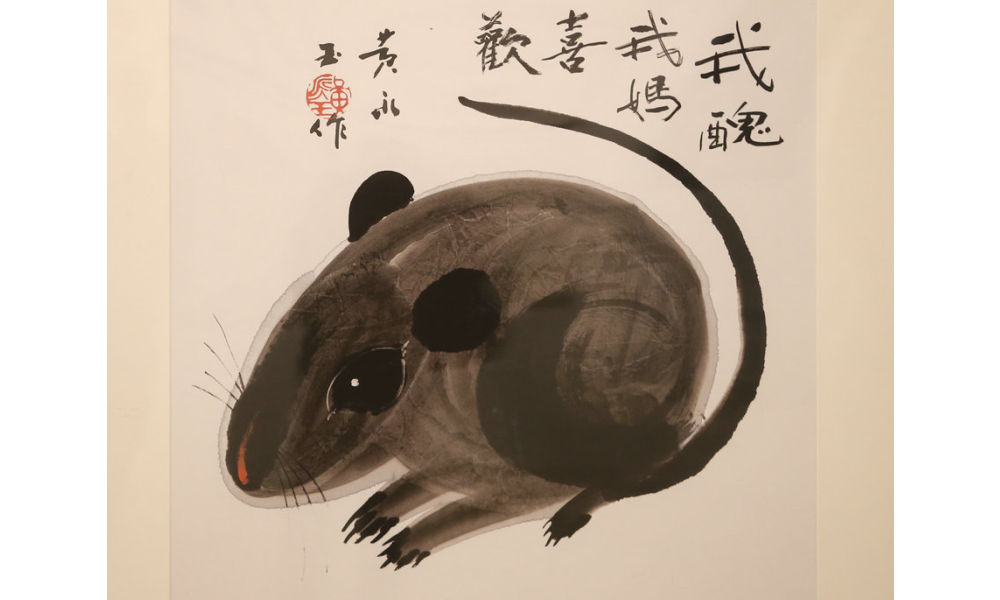
‘Ugly Mouse’ by Huang Yongyu [Image via China Daily].
Huang Yongyu was born on August 9, 1924, in Hunan’s Chengde as a native of the Tujia ethnic group.
He was born into an extraordinary family. His grandfather, Huang Jingming (黄镜铭), worked for Xiong Xiling (熊希齡), who would become the Premier of the Republic of China. His first cousin and lifelong friend was the famous Chinese novelist Shen Congwen (沈从文). Huang’s father studied music and art and was good at drawing and playing the accordion. His mother graduated from the Second Provincial Normal School and was the first woman in her county to cut her hair short and wear a short skirt (CCTV).
Born in times of unrest and poverty, Huang never went to college and was sent away to live with relatives at the age of 13. His father would die shortly after, depriving him of a final goodbye. Huang started working in various places and regions, from porcelain workshops in Dehua to artisans’ spaces in Quanzhou. At the age of 16, Huang was already earning a living as a painter and woodcutter, showcasing his talents and setting the foundation for his future artistic pursuits.
When he was 22, Huang married his first girlfriend Zhang Meixi (张梅溪), a general’s daughter, with whom he shared a love for animals. He confessed his love for her when they both found themselves in a bomb shelter after an air-raid alarm.
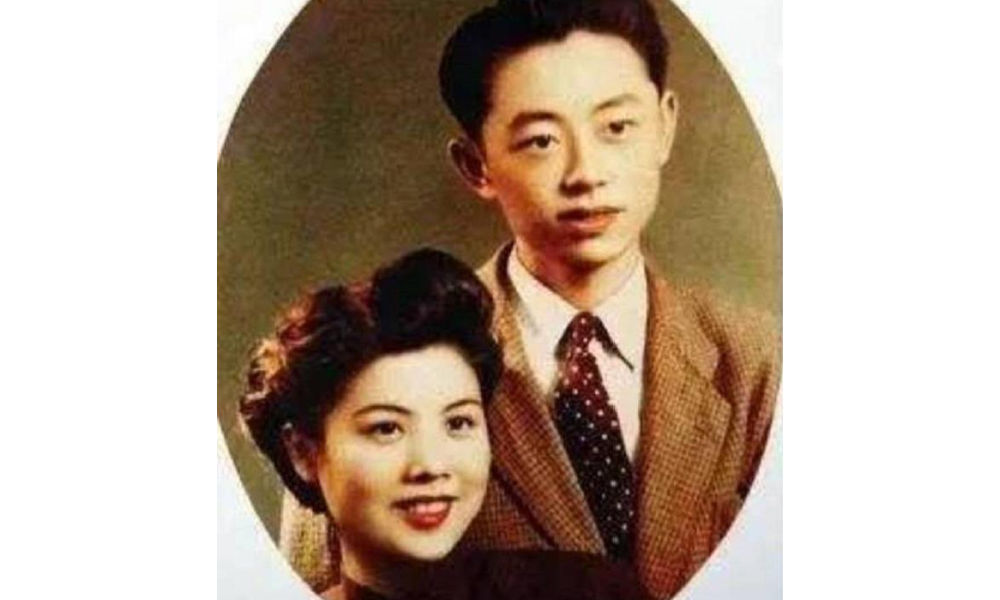
Huang and Zhang Meixi [163.com]
In his twenties, Huang Yongyu emerged as a sought-after artist in Hong Kong, where he had relocated in 1948 to evade persecution for his left-wing activities. Despite achieving success there, he heeded Shen Congwen’s advice in 1953 and moved to Beijing. Accompanied by his wife and their 7-month-old child, Huang took on a teaching position at the esteemed Central Academy of Fine Arts (中央美术学院).
The couple raised all kinds of animals at their Beijing home, from dogs and owls to turkeys and sika deers, and even monkeys and bears (Baike).
Throughout Huang’s career, animals played a significant role, not only reflecting his youthful spirit but also serving as vehicles for conveying satirical messages.
One recurring motif in his artwork was the incorporation of mice. In one of his famous works, a grey mouse is accompanied by the phrase ‘I’m ugly, but my mum likes me’ (‘我丑,但我妈喜欢’), reinforcing the notion that regardless of our outward appearance or circumstances, we remain beloved children in the eyes of our mothers.
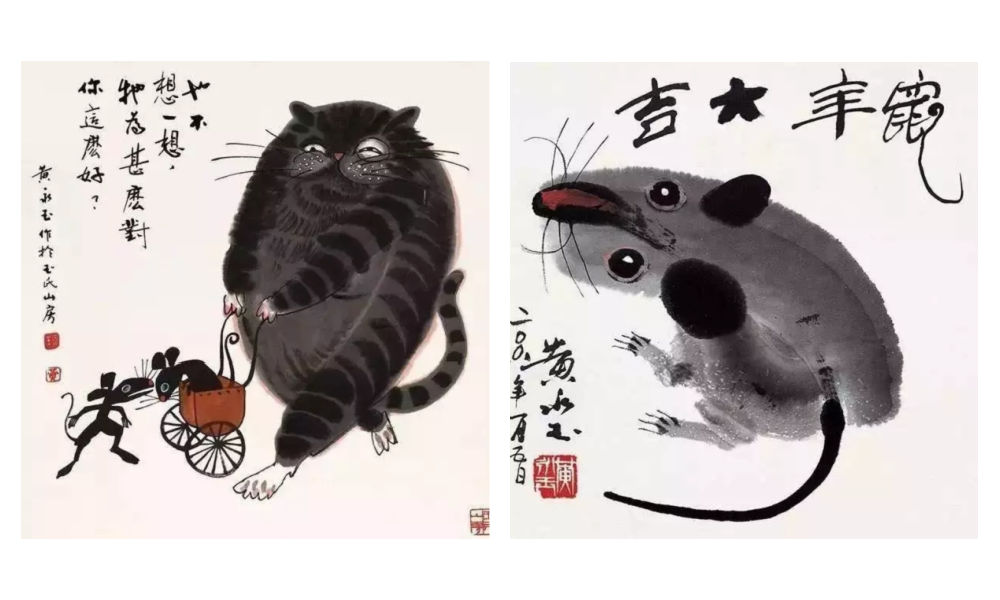
As a teacher, Huang liked to keep his lessons open-minded and he, who refused to join the Party himself, stressed the importance of art over politics. He would hold “no shirt parties” in which his all-male studio students would paint in an atmosphere of openness and camaraderie during hot summer nights (Andrews 1994, 221; Hawks 2017, 99).
By 1962, creativity in the classroom was limited and there were far more restrictions to what could and could not be created, said, and taught.
Bright Colors in Dark Times
“Strengthen my resolve and increase the fun of living”
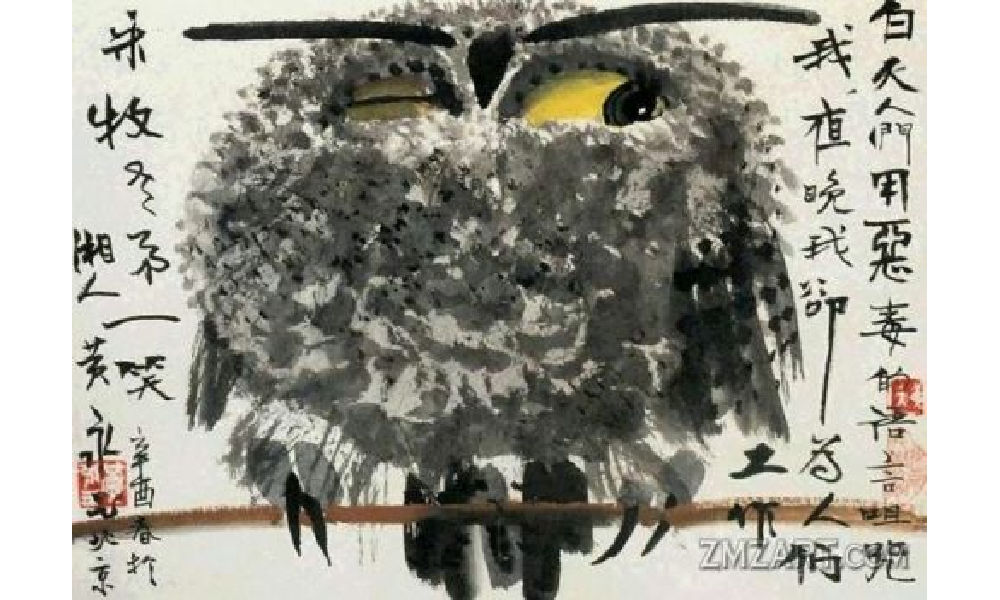
Huang Yongyu’s winking owl, 1973, via Wikiart.
In 1963, Huang was sent to the countryside as part of the “Four Cleanups” movement (四清运动, 1963-1966). Although Huang cooperated with the requirement to attend political meetings and do farm work, he distanced himself from attempts to reform his thinking. In his own time, and even during political meetings, he would continue to compose satirical and humorous pictures and captions centered around animals, which would later turn into his ‘A Can of Worms’ series (Hawks 2017, 99; see Morningsun.org).
Three years later, at the beginning of the Cultural Revolution, many Chinese major artists, including Huang, were detained in makeshift jails called ‘niupeng‘ (牛棚), cowsheds. Huang’s work was declared to be counter-revolutionary, and he was denounced and severely beaten. Despite the difficult circumstances, Huang’s humor and kindness would remind his fellow artist prisoners of the joy of daily living (2017, 95-96).
After his release, Huang and his family were relocated to a cramped room on the outskirts of Beijing. The authorities, thinking they could thwart his artistic pursuits, provided him with a shed that had only one window, which faced a neighbor’s wall. However, this limitation didn’t deter Huang. Instead, he ingeniously utilized vibrant pigments that shone brightly even in the dimly lit space.
During this time, he also decided to make himself an “extra window” by creating an oil painting titled “Eternal Window” (永远的窗户). Huang later explained that the flower blossoms in the paining were also intended to “strengthen my resolve and increase the fun of living” (Hawks 2017, 4; 100-101).
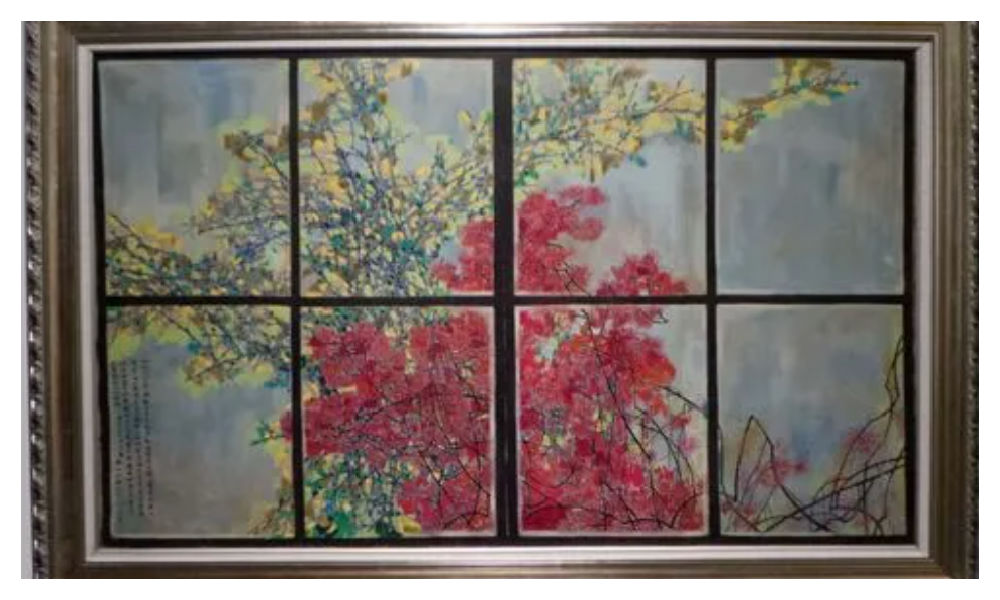
Huang Yongyu’s Eternal Window [Baidu].
In 1973, during the peak of the Cultural Revolution, Huang painted his famous winking owl. The calligraphy next to the owl reads: “During the day people curse me with vile words, but at night I work for them” (“白天人们用恶毒的语言诅咒我,夜晚我为他们工作”) (Matthysen 2021, 165).
The painting was seen as a display of animosity towards the regime, and Huang got in trouble for it. Later on in his career, however, Huang would continue to paint owls. In 1977, when the Cultural Revolution had ended, Huang Yongyu painted other owls to ridicules his former critics (2021, 174).
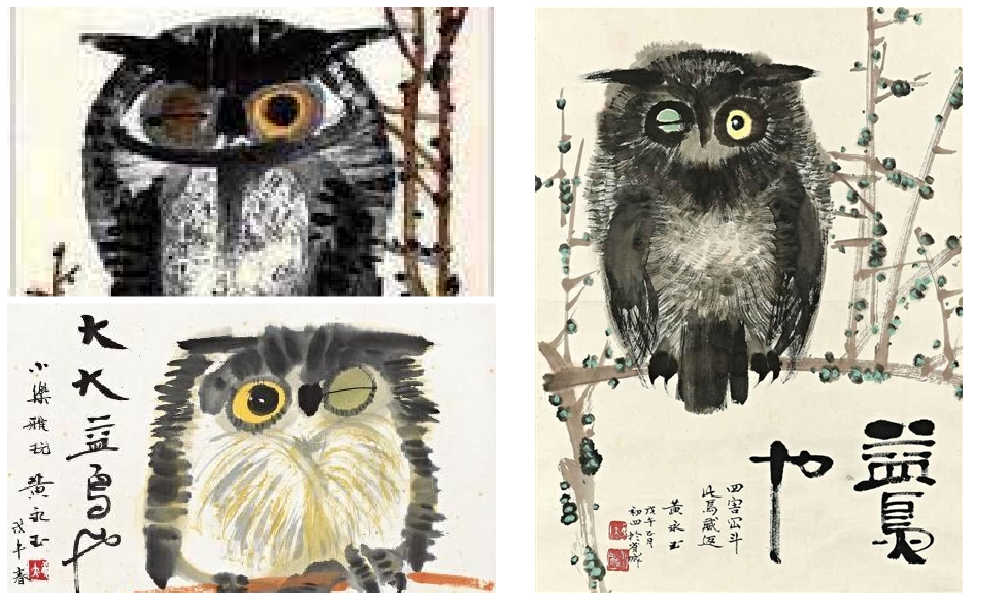
According to art scholar Shelly Drake Hawks, Huang Yongyu employed animals in his artwork to satirize the realities of life under socialism. This approach can be loosely compared to George Orwell’s famous novel Animal Farm.
However, Huang’s artistic style, vibrant personal life, and boundary-pushing work ethic also draw parallels to Picasso. Like Picasso, Huang embraced a colorful life, adopted an innovative approach to art, and challenged artistic norms.
An Optimist Despite All Hardships
“Quickly come praise me, while I’m still alive”
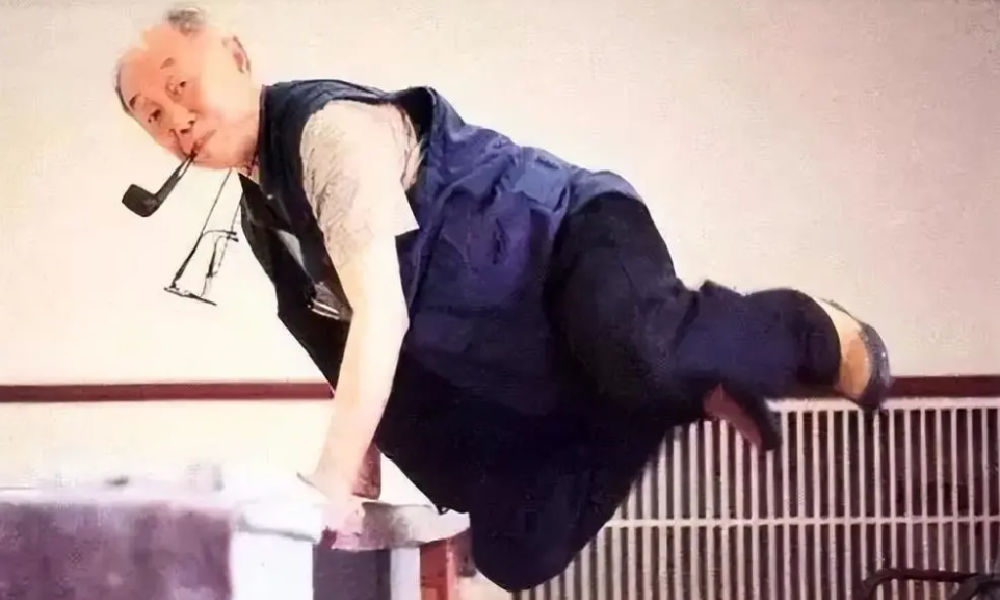
Huang Yongyu will be remembered in China with love and affection for numerous reasons. Whether it is his distinctive artwork, his mischievous smile and trademark pipe, his unwavering determination to follow his own path despite the authorities’ expectations, or his enduring love for his wife of over 75 years, there are countless aspects to appreciate and admire about Huang.
One things that is certainly admirable is how he was able to maintain a youthful and joyful attitude after suffering many hardships and losing so many friends.
“An intriguing soul. Too wonderful to describe,” one Weibo commenter wrote about Huang, sharing pictures of Huang Yongyu’s “Scenes of Pooping” (出恭图) work.
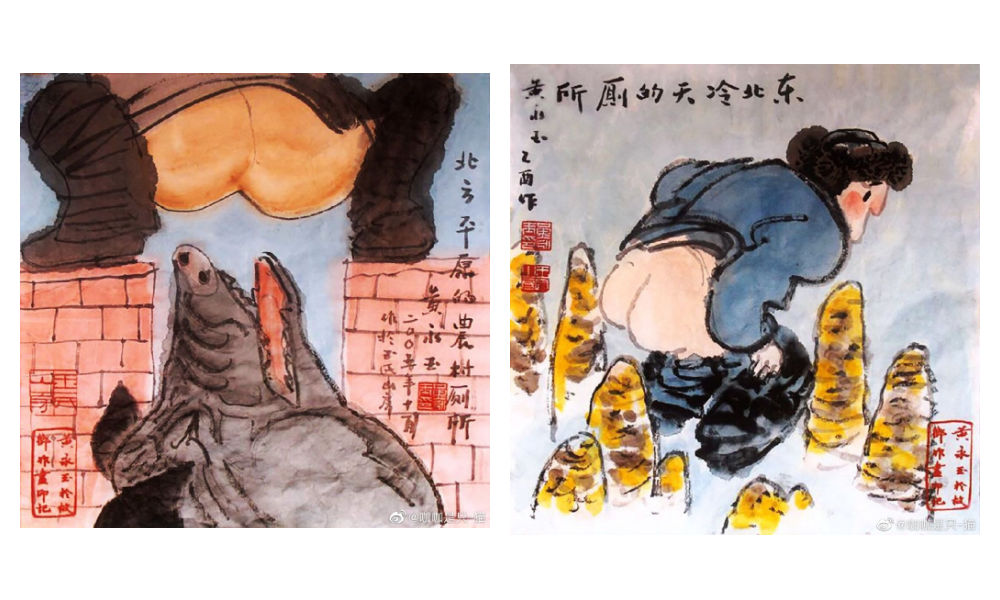
Old age did not hold him back. At the age of 70, his paintings sold for millions. When he was in his eighties, he was featured on the cover of Esquire (时尚先生) magazine.
At the age of 82, he stirred controversy in Hong Kong with his “Adam and Eve” sculpture featuring male and female genitalia, leading to complaints from some viewers. When confronted with the backlash, Huang answered, “I just wanted to have a taste of being sued, and see how the government would react” (Ora Ora).
I'm guessing the 98-year-old Huang loved the controversy. When confronted with backlash for his sculpture featuring male and female genitalia in 2007 Hong Kong, Huang answered, "I just wanted to have a taste of being sued, and see how the government would react." pic.twitter.com/kG0MVVM4SN
— Manya Koetse (@manyapan) June 15, 2023
In his nineties, he started driving a Ferrari. He owned mansions in his hometown in Hunan, in Beijing, in Hong Kong, and in Italy – all designed by himself (Chen 2019).
Huang kept working and creating until the end of his life. “It’s good to work diligently. Your work may be meaningful. Maybe it won’t be. Don’t insist on life being particularly meaningful. If it’s happy and interesting, then that’s great enough.”
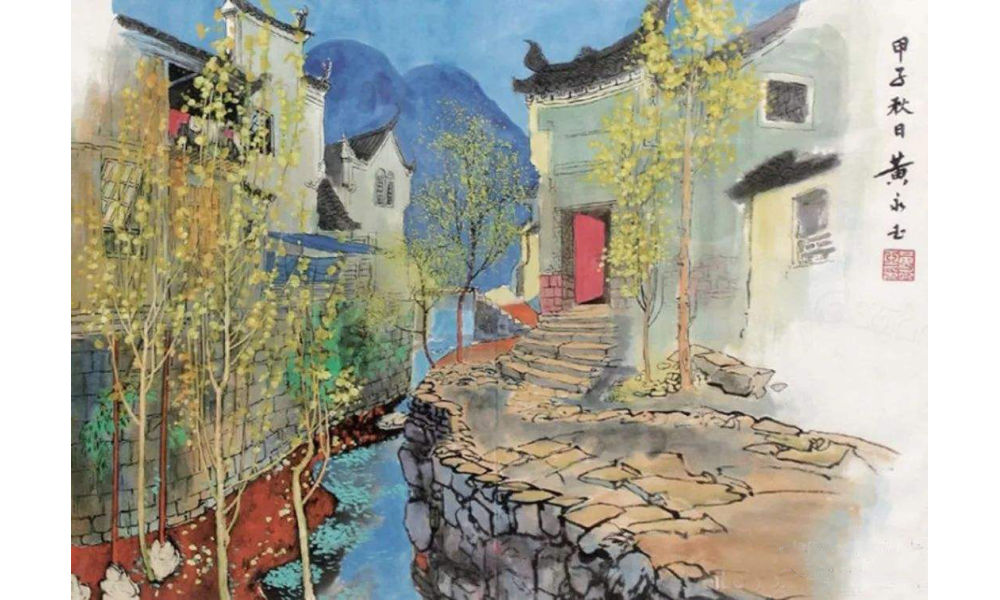
“Hometown Scenery” or rather “Hunan Scenery” (湘西风景) by Huang.
Huang did not dread the end of his life.
“My old friends have all died, I’m the only one left,” he said at the age of 95. He wrote his will early and decided he wanted a memorial service for himself before his final departure. “Quickly come praise me, while I’m still alive,” he said, envisioning himself reclining on a chair in the center of the room, “listening to how everyone applauds me” (CCTV, Sohu).
He stated: “I don’t fear death at all. I always joke that when I die, you should tickle me first and see if I’ll smile” (“对死我是一点也不畏惧,我开玩笑,我等死了之后先胳肢我一下,看我笑不笑”).

Huang with Yiwo (伊喔), the original model for the monkey stamp [Shanghai Observer].
Huang also was not sentimental about what should happen to his ashes. In a 2019 article in Guangming Daily, it was revealed that he suggested to his wife the idea of pouring his ashes into the toilet and flushing them away with the water.
However, his wife playfully retorted, saying, “No, that won’t do. Your life has been too challenging; you would clog the toilet.”
To this, Huang responded, “Then wrap my ashes into dumplings and let everyone [at the funeral] eat them, so you can tell them, ‘You’ve consumed Huang Yongyu’s ashes!'”
But she also opposed of that idea, saying that they would vomit and curse him forever.
Nevertheless, his wife expressed opposition to this idea, citing concerns that it would cause people to vomit and curse him indefinitely.
In response, Huang declared, “Then let’s forget about my ashes. If you miss me after I’m gone, just look up at the sky and the clouds.” Eventually, his wife would pass away before him, in 2020, at the age of 98, having spent 77 years together with Huang.
Huang will surely be missed. Not just by the loved ones he leaves behind, but also by millions of his fans and admirers in China and beyond.
“We will cherish your memory, Mr. Huang,” one Weibo blogger wrote. Others honor Huang by sharing some of his famous quotes, such as, “Sincerity is more important than skill, which is why birds will always sing better than humans” (“真挚比技巧重要,所以鸟总比人唱得好”).
Among thousands of other comments, another social media user bid farewell to Huang Yongyu: “Our fascinating Master has transcended. He is now a fascinating soul. We will fondly remember you.”
By Manya Koetse
Get the story behind the hashtag. Subscribe to What’s on Weibo here to receive our newsletter and get access to our latest articles:
References
Andrews, Julia Frances. 1994. Painters and Politics in the People’s Republic of China, 1949-1979. Berkley: University of California Press.
Baike. “Huang Yongyu 黄永玉.” Baidu Baike https://baike.baidu.com/item/%E9%BB%84%E6%B0%B8%E7%8E%89/1501951 [June 14, 2023].
CCTV. 2023. “Why Everyone Loves Huang Yongyu [为什么人人都爱黄永玉].” WeChat 央视网 June 14.
Chen Hongbiao 陈洪标. 2019. “Most Spicy Artist: Featured in a Magazine at 80, Flirting with Lin Qingxia at 91, Playing with Cars at 95, Wants Memorial Service While Still Alive [最骚画家:80岁上杂志,91岁撩林青霞,95岁玩车,活着想开追悼会].” Sohu/Guangming Daily March 16: https://www.sohu.com/a/301686701_819105 [June 15, 2023].
Hawks, Shelley Drake. 2017. The Art of Resistance Painting by Candlelight in Mao’s China. Seattle: University of Washington Press.
Matthysen, Mieke. 2021. Ignorance is Bliss: The Chinese Art of Not Knowing. Palgrave Macmillan.
Ora Ora. “HUANG YONGYU 黃永玉.” Ora Ora https://www.ora-ora.com/artists/103-huang-yongyu/ [June 15, 2023].
Spotted a mistake or want to add something? Please let us know in comments below or email us. First-time commenters, please be patient – we will have to manually approve your comment before it appears.
©2023 Whatsonweibo. All rights reserved. Do not reproduce our content without permission – you can contact us at info@whatsonweibo.com.
Subscribe

Weibo Watch: The Future is Here

“Bye Bye Biden”: Biden’s Many Nicknames in Chinese

Enjoying the ‘Sea’ in Beijing’s Ditan Park

A Triumph for “Comrade Trump”: Chinese Social Media Reactions to Trump Rally Shooting

Weibo Watch: Get Up, Stand Up

The Tragic Story of “Fat Cat”: How a Chinese Gamer’s Suicide Went Viral

“Old Bull Eating Young Grass”: 86-Year-Old Chinese Painter Fan Zeng Marries 36-Year-Old Xu Meng

A Brew of Controversy: Lu Xun and LELECHA’s ‘Smoky’ Oolong Tea

Singing Competition or Patriotic Fight? Hunan TV’s ‘Singer 2024’ Stirs Nationalistic Sentiments

Zara Dress Goes Viral in China for Resemblance to Haidilao Apron

Weibo Watch: The Battle for the Bottom Bed

About the “AI Chatbot Based on Xi Jinping” Story

China’s Intensified Social Media Propaganda: “Taiwan Must Return to Motherland”

Weibo Watch: Telling China’s Stories Wrong

Saying Goodbye to “Uncle Wang”: Wang Wenbin Becomes Chinese Ambassador to Cambodia
Get in touch
Would you like to become a contributor, or do you have any tips or suggestions? Get in touch here!
Popular Reads
-

 China Insight3 months ago
China Insight3 months agoThe Tragic Story of “Fat Cat”: How a Chinese Gamer’s Suicide Went Viral
-

 China Music4 months ago
China Music4 months agoThe Chinese Viral TikTok Song Explained (No, It’s Not About Samsung)
-

 China Digital10 months ago
China Digital10 months agoToo Sexy for Weibo? Online Discussions on the Concept of ‘Cābiān’
-

 China Arts & Entertainment12 months ago
China Arts & Entertainment12 months agoBehind 8 Billion Streams: Who is Dao Lang Cursing in the Chinese Hit Song ‘Luocha Kingdom’?

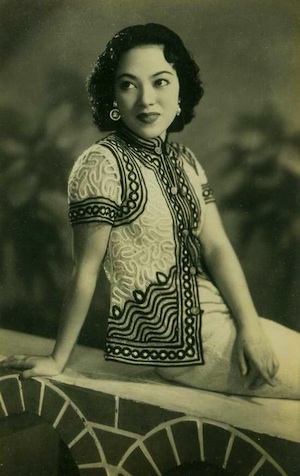
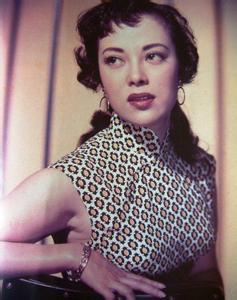





Lawrence
September 14, 2014 at 1:17 pm
Mooie vrouw, fascinerende achtergrond. Bedankt voor het artikel!
Stanley
September 15, 2014 at 9:45 am
According to her book, she called Japan her fatherland and China her motherland as she born to Japanese parents but raised in China.
Rena Inoue
July 20, 2020 at 7:57 pm
Li Xianglan wasn’t a dwarf pretending to be Chinese! It’s a misconception that Li Xianglan was purely Nihonjin Japanese. Her mother & father Fumio both loved China and he had 2 Chinese Blood Brothers, General Li Jichun (李際春) and Mayor Pan Yugui (潘毓桂). By Chinese custom for those who became sworn blood brothers, they also became Yoshiko’s “Godfathers” and gave her two Chinese names, Li Xianglan (Li Hsiang-lan) and Pan Shuhua (潘淑華). (“Shu” in Shuhua and “Yoshi” in Yoshiko are same Chinese character).the Yamaguchi family moves into a large 3-story house inside the Li family compound (after Japanese secret police arrest her father for colluding with Chinese rebels in Mukden after an attack) In return, the family cared for the second wife of Li who had bound-feet. Yoshiko has a great affection for this hobbling lady “whose spoken Mandarin sounded like singing” and she “learns Mandarin from her from morning till night”. Yoshiko would also help Madame Li to massage her sore feet. Old General Li treats Yoshiko as though she were his own daughter. With her father Fumio’s blessing and in an elaborate formal ceremony, the Li family adopts Yoshiko and gives her the Chinese name 李香蘭 Lǐ Xiāng Lán 李香蘭 Yoshiko later used the name, Li Xianglan [a perfect stage name because if her real name was used (like if it was *Stefani Germanotta (Lady Gaga)and assumed the latter name, Pan Shuhua while she was staying with the Pan family in Beijing for 4 years while going to a Chinese Girl high school following her recuperation from tuberculosis), Yoshiko’s father and General Li decide that she will move south, to another powerful family friend Pan, located in central Beijing (Peking) in order to continue her Chinese education there. In order to strengthen her breathing after TB, the doctor recommended voice lessons. Her father initially insisted on traditional Japanese music, but Yoshiko preferred Western music and thus received her initial classical vocal education from an Italian dramatic soprano (Madame Podresov, married into White Russian nobility) introduced by BFF, Lyuba (a Russian-Jewish girl, She later received schooling in Beijing, accommodated by the Pan family. She was a coloratura soprano. So all her childhood & teen years she lived with 2 powerful Chinese Godparents so she was actually more Chinese then Japanese.
Later after becoming famous, she finally went to Japan, in 1941 for a publicity tour, dressed in a cheongsam and while speaking Japanese with a Mandarin accent, the customs officer asked her upon seeing she had a Japanese passport and a Japanese name: “Don’t you know that we Japanese are the superior people? Aren’t you ashamed to be wearing third-rate Chink clothes and speaking their language as you do? 1st time she was called traitor!
Rena Inoue
July 20, 2020 at 8:23 pm
Xinglan had already had her 1933 ‘coming out’ concert at the Yamato Hotel, been chosen by the Fengtian Radio Station as the only girl capable of singing and communicating in several languages, and was rapidly learning the art of singing while accompanied by live bands on the radio. The name by which she became known all across Manchuria was Li Xianglan [a perfect stage name because if her real name was used (like if it was *Stefani Germanotta] she would not have become known at all [just like *Lady Gaga became known by all].
Xianglan was indeed a very special person to have accomplished all this by the age of 14.
On the subject of changing one’s name when entering ‘show business’ (or the Showa Business as one wit has called it): is there any need to mention here all the Hollywood actors with names such as Issur Danielovitch, who found the name of Kirk Douglas to be much easier on the ears of his intended audience? I don’t see anyone throwing rocks at Mr. Danielovitch (or anyone else who has done the same thing) for the crime of masquerading as someone else. Shall we mention all the famous Hollywood actors of one race (such as Anthony Quinn) who successfully passed as other races (and managed to keep their real race a secret for many years)? And while we are in this territory, what about the propaganda films of Hollywood that have had both overt and covert political and social agendas? Let’s not be hypocrites.
Yoshiko recalls her May 1934 train-trip from Mukden to Beijing; her father bought her a ticket at the Mukden Station and says “You’ll be living as a Chinese person from now on, so get used to it.” Of course, she thought he would be travelling with her, but due to some business foul-up of some kind, she found herself travelling all alone! She recounts the harrowing night-journey by train from Fengtian to Beijing, a distance of 470 miles: a lone 14yr old girl in the ‘hard-seats’ (the common-folk section), pretending to be Chinese due to the anti-Japanese sentiment, in the midst of pouring rain, lightning, howling wind, and worries about being robbed or attacked by bandits or guerrillas. Yoshiko tells about a harrowing slow crossing over a long railroad bridge barely higher than the flooded river below. Oh, and she was hiding a large bundle of money in her clothes for her father which she was afraid would be confiscated along the way – she was totally terrified!
No Japanese would take such a long trip through bandit territory unless they were military men, and here was this little sparrow of a girl, at one point hiding in the train’s bathroom from the Conductor. The ‘hard seat’ section of the train was filled with Chinese farmer people, chickens, other animals, and the stench of urine was thick in the air. Talk about having to grow up fast and think on your feet!
The Pan family adopts Xianglan in 1934 and names her Pan Shuhua (the name she uses while attending high school). To give some idea of the size of the Pan compound, there are several large house residences surrounding a central courtyard/garden area, and Yoshiko mentions how easy it was to lose one’s way and get lost. There are about 100 people either working for or part of the family, including wives, relatives, servants, concubines, plus 2 armed guards with fixed bayonets at the gate entrance. Xianglan, at first she leads a lonely life and is forced to totally immerse herself in Mandarin. She is befriended by two of her adoptive sisters, and they all attend school and take various lessons together. She attends the Beijing Yijiao Girls School 北京 一角 中学 (a Chinese mission school mainly attended by rich ‘pillars of society’ girls). This school must have been located inside the Inner City
Mr. Pan, born Chinese, is another ‘cross-cultural’ person, having attended Japan’s Waseda University, and he is by no means the only example of such people who due to circumstance, traveled easily between and understood both cultures. In the case of Pan Yugui, he was skillful enough to rise to very powerful positions in Northeastern China while working (some would say collaborating) with the Japanese (and was able to avoid execution after the war because of various ‘good-works’ he accomplished for Chinese people as well).She writes travelogue-style descriptions of the famous Imperial City and Forbidden City, spending many a pleasant time visiting there, sometimes while riding horses (she and her adoptive sisters were taking equestrian lessons). Most of the time she was practicing her Mandarin, She must have fantasized about being a royal Chinese princess during such horse-rides because she seems to know and love each structure of note inside the Forbidden City.While living with the Pan family, Yoshiko recounts some interesting every-day experiences. She frequently awoke to “performances by the pipe ensemble of the pigeons of Picai Hutong.” As the sun would rise [no, the phrase she uses is “as the eastern sky began to light up”] in the morning, a large formation of pigeons would soar into the sky; little pipes made of bamboo were tied to the birds feet and would whistle when the birds swooped and soared, providing a natural ‘alarm clock’ as the day dawned for the Hutong residents. Only the ancient Chinese could’ve thought of harnessing pigeons in flight to provide a “pipe ensemble” which made such a delightful sound!
The bathing situation of the Pan family was less than ideal: although they had modern western fixtures such as bathtubs, there was no running water, so washing had to be done the old-fashioned way, which involved basins of warm-water. For full baths, the whole family would spend a whole pleasurable day at a large public bathhouse, followed by a luxurious meal at a fine restaurant, complete with music provided by an er’hu (Chinese violin) player.
Along with Pan Shuhua’s duties as Mr. Pan’s helper/secretary, she had other chores to perform, one of which was preparing opium for Mr. Pan and his guests. This involved heating a portion of thick brownish syrup in a small ivory bowl, congealing it on a long needle, and then reheating it to create a nice ‘smoke’ which was then inhaled from a long opium pipe. When Yoshiko grew older and “looked back on her Beijing years”, she was “surprised that such important people like Pan had turned into habitual abusers of opium.”
I’m sure she made use of such experiences when it came time to make her famous “Eternity” film whose plotline revolves around the pernicious effects of opium, and indeed, one of her most famous songs is called the “Quitting Opium Song.”
While with the Pan family, Yoshiko conveys an interesting exchange with her adoptive mother concerning her ‘Japanese habits’.
One day Madame Pan takes her aside and gives her some advice: “First, stop smiling so much when there is nothing to smile about! (the Japanese custom is for a woman to smile constantly in order to be polite and ‘charming’). The Chinese call this “selling one’s smile” and it is looked upon with contempt. Second, stop bowing so much! “it’s all right to nod your head slightly, but stop making such deep bows as the Japanese do. We regard that as servile behavior.” Yoshiko takes this advice to heart, and says that her later experiences in Europe and the United States confirmed people’s mannerisms were similar to those of China.
The interesting thing about the above is that it shows how Madame Pan takes genuine care of her adopted daughter, and it gives us an insight into a very human situation.
This is yet another example of how Yoshiko came to prefer Chinese over Japanese social mores; the Japanese were constricting, filled with various duties which had to be honored, whereas the Chinese were more free and easy. Take the example of simply laughing at something one finds funny: the Japanese girl will ‘politely’ cover her mouth, whereas the Chinese will more often laugh out loud as western people do.
However, this did cause some problems when Yoshiko would return home to visit her parents and her Japanese mother Aiko would bemoan how “the big city life had corrupted” her Japanese etiquette. It’s here we get some insight into how difficult a task it was for Yoshiko to actually ‘become Chinese’, because it meant ‘losing her Japanese character’, and of course the reverse was true also. This would not have been any great problem if both her “parents” (ie, Japan and China) had not been at war with one another.
Rena Inoue
July 21, 2020 at 6:09 pm
In the 1950s, she established her acting career as Shirley Yamaguchi in Hollywood and on Broadway (in the short-lived musical “Shangri-La”) in the US. She married Japanese-American sculptor Isamu Noguchi in 1951. Yamaguchi was Japanese, but as someone who had grown up in China, she felt torn between two identities/ nations and later wrote she felt attracted to Noguchi as someone else who was torn between two identities. They divorced in 1956. Weibo critics don’t seem to know that She revived the Li Hsiang-lan name and appeared in several Chinese language films made in Hong Kong. Some of her 1950s Chinese films were destroyed in a studio fire and have not been seen since their initial releases. Her Mandarin hit songs from this period include “Three Years” (三年), “Plum Blossom” (梅花), “Childhood Times” (小時候), “Only You” (只有你), and “Heart Song” (心曲 – a cover of “Eternally”).
Grace Wong-Pak
July 23, 2020 at 7:44 pm
Actually Li Xianglan thought of China as her Mother since she was born and , 3rd generation in 遼陽;Liáoyáng, Manchuria and raised in Shenyang (沈阳).
She learned Mandarin as a small child from her father who taught Mandarin & Chinese culture to Japanese workers. She then went to a Chinese school.
She was adopted by 2 powerful Chinese families who she lived with her childhood with General Li Jichun (李際春) who named her Li Xianglan. After the age of 13 she lived with Pan Yugui (潘毓桂) who named her Pan Shuhua (潘淑華). (“Shu”(淑) in Shuhua (淑華) and “Yoshi”(淑) in Yoshiko ( 淑子) are written with the same Chinese character) (the name she uses while attending Beijing Yijiao Girls Prep High School (北京 一角 中学) (college level classes) in Peking ( 北京)! Madame Pan also taught her how to be more Chinese so her classmates wouldn’t bully her for being Japanese. Anti-Japanese was so high that her father ordered her to come back but she refused. Also wanted her to learn traditional Japanese music but also refused. preferred to learn modern jazz/ Mandopop music. So she was more Chinese then Japanese horrifying her Japanese mother as acting unladylike. She felt like a foreigner in Japan after WW2 cuz she never before lived in Japan. Maybe why later in life, she became an outspoken journalist supporting women refugees worldwide like the Palestinians. Yasir Arafat gave her the Palestinian name “Jamila Yamaguchi”and was in Cambodia & Vietnam wearing a Áo dài during the Vietnam war as anti-war. She also interviewed Fusako Shinenobu the leader of the Red Army. (while in Hollywood late 50’s, was refused entry back to the US for having Communist friends). She returned to Japan and after retiring from the world of film in 1958, she appeared as a hostess and anchorwoman on TV talk shows. As a result of her marriage to the Japanese diplomat Hiroshi Ōtaka, she lived for a while in Burma (modern Myanmar) And also ran for office in Japan’s Diet supporting peace between her mother (China) and Japan (father) & supporting redress & apology to the Asian comfort women used by Japanese soldiers WW2 and was vice president to the Asian Woman’s Fund. Visited Beijing China as LDP’s North Korean delegate, 1975 and visited China & Manchuria on environmental issues, 1979.
Grace Pak
August 2, 2020 at 12:51 am
Has China decided to ‘rehabilitate’ the legacy of Li Xiang Lan?
The Communist Party of China and Ministry of Defense of the People’s Republic of China websites both published her life story in five parts.
The China International Women’s Film Festival in June 2016 at Shenyang Railway Station prominently featured a documentary film on her life by the Taiwanese film-director Chen Meijuin.